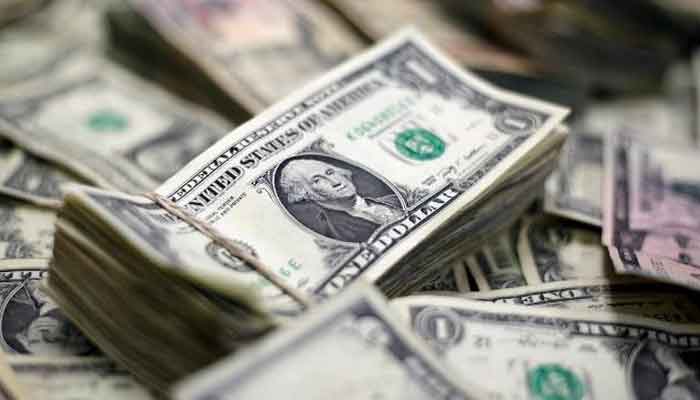Forex firms warn FBR’s arm-twisting to weigh on rupee
"If FBR notices are implemented they will contribute towards depreciating rupee to Rs200 against US dollar," warn currency dealers
KARACHI: Foreign currency dealers are flustered by Federal Board of Revenue (FBR) notices, demanding collection of taxes on foreign exchange transactions, which may lead to currency depreciation and encourage illegal money exchange and transfer.
“FBR is issuing unnecessary notices which have become a cause of harassment to them,” said Exchange Companies Association of Pakistan (ECAP) in a letter to the federal finance minister. Malik Bostan, chairman ECAP, said the FBR had asked the exchange firms to pay 16 percent federal excise duty (FED) on income earned by customers from buying and selling of foreign currency to them.
“If FBR notices are implemented they will contribute towards depreciating rupee to Rs200 against US dollar and support illegal hundi-hawala market,” he added.
Bostan said the exchange firms, which deal in buying and selling of the foreign currencies, were not a part of services sector and were already paying 29 percent income tax on their incomes. In a major move, the government has also decided to set up a point of sale (POS) unit at all forex companies to document transactions of the foreign exchange dealers or exchange companies, and directed them to online integrate with the FBR’s computerised system.
Foreign exchange dealers and companies now fall under Tier1 category, as per the FBR notice. The FBR has notified SRO50(I)/2022 to draft amendments in the Income Tax Rules, 2002. It has issued instructions to the money changers in this regard. According to the FBR, the board has included foreign exchange dealers/exchange companies in the list of the businesses that are required to online integrate their businesses.
“Every exchange company has to install POS, according to the FBR, people’s daily buying and selling of foreign exchange currency will be further recorded,” said Zafar Paracha, Secretary General ECAP.
“The decision is expected to help qwiden tax net and curb money laundering; it will also control unnecessary demand for dollars in the market, we welcome this move,” Paracha added.
Established under the Foreign Exchange Regulation Act, 1947, Exchange Companies (ECs) have been actively playing their role in facilitating the foreign exchange transactions. ECs have been growing steadily with expanding networks, improving profits and sufficient capital.
The scope of business of ECAs include buying and selling of foreign currencies, inward home remittances, outward remittances, export of foreign currencies other than US dollars, branchless banking as agents of authorised financial institutions, collection of utility bills and installation of banks’ ATMs at their branches. ECs are prohibited to engage in any other activity such as deposit taking, lending etc.
-
 World Economic Forum CEO Borge Brende Steps Down Following Jeffrey Epstein Ties Controversy
World Economic Forum CEO Borge Brende Steps Down Following Jeffrey Epstein Ties Controversy -
 Prince Harry's Ex Chelsy Davy Makes Special Announcement
Prince Harry's Ex Chelsy Davy Makes Special Announcement -
 Dominic Evans Speaks Out After Being Accused Of Being Involved In Nancy Guthrie Kidnapping
Dominic Evans Speaks Out After Being Accused Of Being Involved In Nancy Guthrie Kidnapping -
 AI Doomsday By 2028? New Study Warns Of Global Social, Economic Disruption & ‘ Intelligence Crisis’
AI Doomsday By 2028? New Study Warns Of Global Social, Economic Disruption & ‘ Intelligence Crisis’ -
 Do Sophie And Benedict Bridgerton Get Married As Netflix Show Returns For Season 4 Part 2?
Do Sophie And Benedict Bridgerton Get Married As Netflix Show Returns For Season 4 Part 2? -
 Prince William Reveals He's 'a Little Biased' Toward One Hollywood Star
Prince William Reveals He's 'a Little Biased' Toward One Hollywood Star -
 Meghan Markle, Prince Harry Visit Special Charity On Final Day Of Jordan Trip
Meghan Markle, Prince Harry Visit Special Charity On Final Day Of Jordan Trip -
 Natalie Dormer's Reaction To Sarah Ferguson's Epstein Links Resurfaces After 'The Lady' Release
Natalie Dormer's Reaction To Sarah Ferguson's Epstein Links Resurfaces After 'The Lady' Release -
 Did You Know Famous Windows 10 Background Was Shot In Real Life? Here's Story
Did You Know Famous Windows 10 Background Was Shot In Real Life? Here's Story -
 Pete Davidson's Baby Mommy Elsie Hewitt Reveals Why She 'hated' Being Pregnant
Pete Davidson's Baby Mommy Elsie Hewitt Reveals Why She 'hated' Being Pregnant -
 Harry, Meghan Show Royal Family How To Make Impact Without Public Money
Harry, Meghan Show Royal Family How To Make Impact Without Public Money -
 Hillary Clinton Set For Deposition Before House Committee Today In Jeffrey Epstein Investigation Case
Hillary Clinton Set For Deposition Before House Committee Today In Jeffrey Epstein Investigation Case -
 Samsung Galaxy S26 Ultra Debutes With Display That Blocks Side Viewers
Samsung Galaxy S26 Ultra Debutes With Display That Blocks Side Viewers -
 Fans In Shock As 'Smiling Friends' Creators End Cult-favourite Sitcom On Adult Swim: 'They Did It On Purpose'
Fans In Shock As 'Smiling Friends' Creators End Cult-favourite Sitcom On Adult Swim: 'They Did It On Purpose' -
 Meghan Markle Accused Of Mimicking Kate’s Iconic Style On 'pseudo Royal Tour'
Meghan Markle Accused Of Mimicking Kate’s Iconic Style On 'pseudo Royal Tour' -
 Social Media Addiction ‘like Smoking’: Mumsnet Calls For Under-16s Ban With Cigarette-style Warnings
Social Media Addiction ‘like Smoking’: Mumsnet Calls For Under-16s Ban With Cigarette-style Warnings




